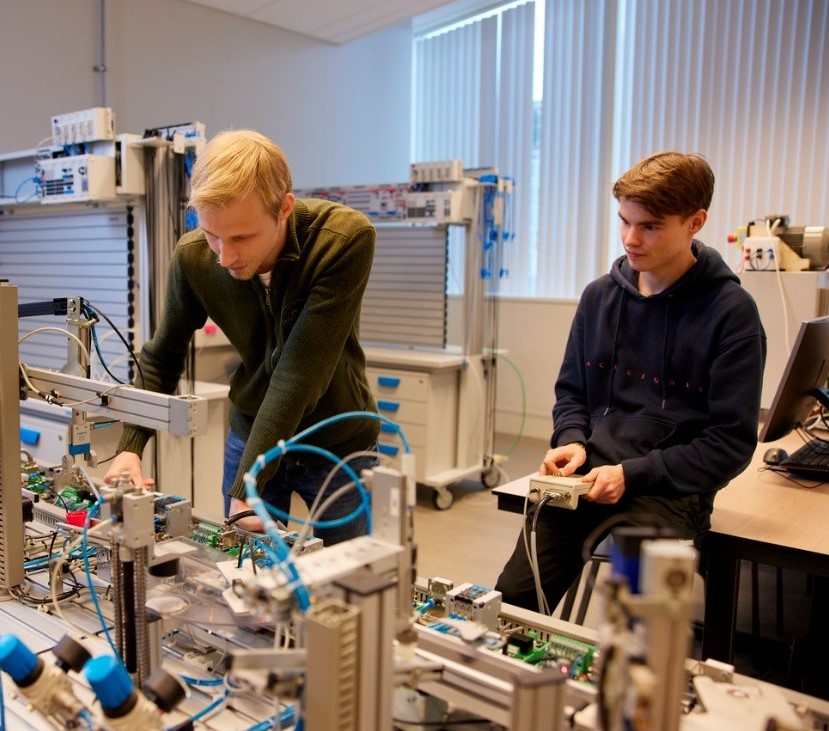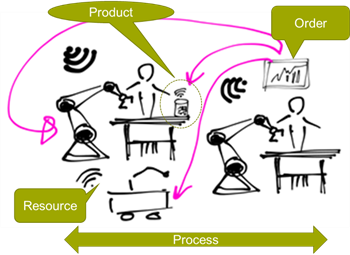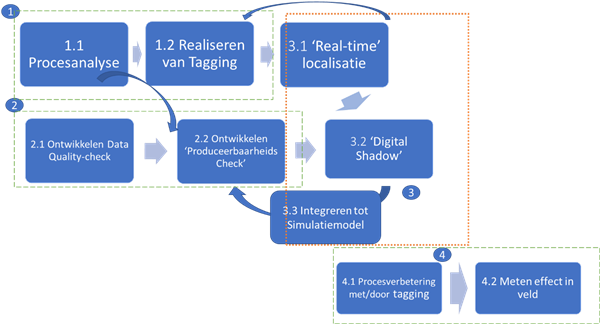TranSIT-Transferable Smart Industry Templates
A significant proportion of the SME companies in our region engineer and assemble custom or small series products. The emphasis is on short lead times and high quality. Quality control is very important.
Centre of Expertise Digital Operations & Finance

A significant proportion of the SME companies in our region engineer and assemble custom or small series products. The emphasis is on short lead times and high quality. Quality control is very important. Process improvements are almost always aimed at reducing errors, searches and unnecessary actions. But they don't want to invest in the wrong technology or working methods and are very wary of vendor lock-in or lengthy projects with external consultants. Automation of production steps 'as-such' is, due to the single piece/small series nature, only interesting if the programming effort is limited and the return of investment (ROI) is short.
Early adopter companies are taking steps, e.g., with the use of robots, the use of autonomous transport and image recognition. Examples of SMEs that have successfully implemented Industry 4.0 across the board are scarce. Also, there are no SME best-practice examples available for other SMEs.
Digitisation in an SME manufacturing company
The dot on the horizon is a fully integrated 'manufacturing system' in which the individual elements are aware of each other, can communicate in real time and collaborate. The physical processes use virtual information to work efficiently and without errors, even with small series or single piece products.
This requires action at the front end of the process: - good product data management; - re-using engineering data; - generating work instructions and production routing; - proper integration of the various engineering and production IT applications (CAD-PDM-ERP-MES)
During the operation the following is needed: - real-time tracking of products in the system, - generating or storing manufacturing instructions on/via a tag, - the network to communicate between elements in the manufacturing system, etc.
Finally, for monitoring and process improvement there is a need for: - analysing, visualising and using the collected data for process control and improvement; - being able to carry out simulations in advance; - using digital shadows; - integrating (autonomous) transport and logistics in the system, etc.
The crux is to be able to collect and process as much data and information as possible with as little effort as possible. This brings virtualisation of the production system for small series and single pieces for 'First Time Right' within reach.
Transforming best practices into templates
Companies that make very different products have similar questions about the process and can learn from each other without competing. The aim of this project is therefore to develop, share and disclose knowledge on 'how to realise a digital and smart production process' via templates. And in such a way that developed methods, snippets, modules, applications etc. can also work at other companies with products in small series. Companies then run less risk and the necessary knowledge is anchored more broadly than with just the experts in their own organisation.
Approach & Collaboration
Companies that are interested in collaborating with our lecturer-researchers, students and other companies on the topics listed below are more than welcome to contact us. We will then discuss what is possible and in what form.
- Process analysis and real-time monitoring of the process by means of tags;
- Manufacturability check and risk management tool;
- Simulation model/Digital Shadow of the process;
Team
- Jenny Coenen, professor of the research group Smart Sustainable Manufacturing, [email protected]
- Rufus Fraanje, Robotics & Vision Minor Coordinator and researcher within the research group Smart Sustainable Manufacturing, [email protected]
- Wouter Hijink, lecturer Control Engineering, Automation, Control Theory and System Engineering and researcher within the research group Smart Sustainable Manufacturing, [email protected]
We will keep you informed of developments here.
Digitalisering in een MKB maakbedrijf
De stip op de horizon is een volledig geïntegreerd ‘manufacturing system’ waarin de afzonderlijke elementen zich bewust zijn van elkaar, real-time met elkaar kunnen communiceren en samenwerken. De fysieke processen gebruiken virtuele info om efficiënt en zonder fouten te werken, ook bij kleine series of enkelstuks producten.
Dit vraagt actie aan de voorkant van het proces: -goed product data-management;- hergebruik van engineering data;- genereren van werkinstructies en productierouting; -goede integratie van de verschillende engineering en productie IT applicaties (CAD-PDM-ERP-MES)
Tijdens de operatie is het volgende nodig: -real-time volgen van producten in het systeem, -het oproepen of opslaan van maakinstructies op/via een tag, -het netwerk om te communiceren tussen elementen in het productiesysteem etc.
Tenslotte is voor monitoring en procesverbetering behoefte aan:-verzamelde data analyseren, visualiseren en gebruiken voor procesbesturing en verbetering, -kunnen uitvoeren van simulaties vooraf-gebruik maken van digital shadows; -(autonoom) transport en logistiek integreren in het system etc.
De crux is zoveel mogelijk data en informatie te kunnen verzamelen en verwerken tegen zo min mogelijk effort. Zo komt virtualisatie van het productiesysteem voor kleine series en enkelstuks ten behoeve van ‘First Time Right’ binnen bereik.

Aanpak & Samenwerking
Bedrijven die interesse hebben om samen te werken met onze docent-onderzoekers, studenten EN andere bedrijven aan onderstaande onderwerpen zijn meer dan welkom om contact op te nemen. Wij overleggen dan wat er mogelijk is en in welke vorm.
- Procesanalyse en het real-time monitoren van het proces middels tags;
- Produceerbaarheidscheck en risicomanagement tool;
- Simulatiemodel/Digital Shadow van het proces;

Team
- Jenny Coenen, lector Smart Sustainable Manufacturing, [email protected]
- Rufus Fraanje, coördinator Robotics & Vision Minor en docent-onderzoeker, [email protected]
- Wouter Hijink, docent BARS (Besturingstechniek, Automatisering, Regeltechniek, Systeemkunde) en docent-onderzoeker, [email protected]
We houden jullie hier op de hoogte van de ontwikkelingen.